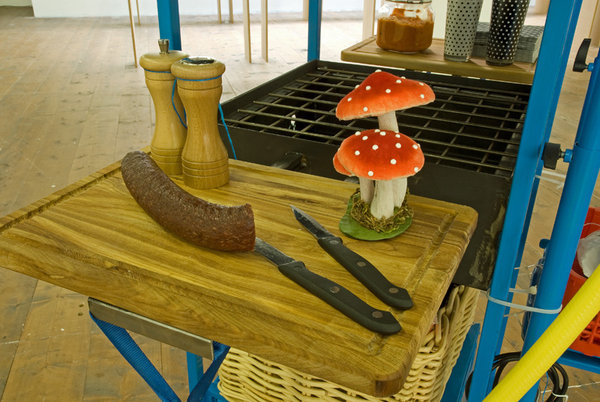Soft City
dal 11/9/2009 al 7/11/2009
Segnalato da
Azra Aksamija
Pushwagner
Dubravka Sekulic
Krijn Christiaansen
Ingrid Mol
Ralf Pasel
Immanuel Sirron-Kakpor
Remy Janssen
Ghana Atelier
Peter Zuiderwijk
Onno Dirker
Ergun Erkocu
11/9/2009
Soft City
Stroom Den Haag, The Hague
Azra Aksamija, Pushwagner, Dubravka Sekulic

How do people organise their space? Or do they allow themselves to be organised? How do unregulated private initiatives contribute to the development of a city? Are there any guidelines, and when do the upholding of public order and legislation start to impact this process? The exhibition 'Soft City' presents existing and new work by the international artists Azra Aksamija, Pushwagner and Dubravka Sekulić. Their work represents the extreme ways in which people create urban (living) space. And how the authorities play a role in this, or, in contrast, are completely sidelined. Their work shows attention to the mental, psychological and socio-economic consequences of this process.
In his graphic novel 'Soft City' (1969-1975), the controversial Norwegian artist Hariton Pushwagner (1940, Oslo) sketches standardised daily life in an Orwellian city. With compassion, a sense of the absurd and an occasionally satirical outlook, Pushwagner follows the life of the residents. This is the first presentation of his work in the Netherlands.
The exhibition 'Soft City' shows the specific way in which artists depict the mental, psychological and socio-economic effects of how people are organizing or are being organized.
Pushwagner
In his key work, the pictorial novel 'Soft City' (1969 - 1975), the controversial Norwegian artist Hariton Pushwagner (1940, Oslo) describes the standardized daily life in an Orwellian, dystopian city. With compassion, feeling for the absurd and a sometimes satirical view, Pushwagner perceives the life of a family in a top-down organized city.
Website Pushwagner http://www.pushwagner.no/?id=1%E2%8C%A9=2
Azra Aksamija
For four years Azra Aksamija (1976, Sarajevo, Bosnia-Herzegovina) observed ‘Arizona Market', the largest black market in the Balkans, which grew into a settlement with 2200 companies, 65 bars and 7 nightclubs. She describes this city as a bottom-up "bizarre body, surrounded by minefields and ruins". Impressed by the vitality of the residents and their ability for self-organization, Aksamija created ‘Arizona Road' (2002), an installation consisting of video registrations and architectural interventions for the benefit of a flexible urban development. In addition to ‘Arizona Road' Aksamija also shows the brand-new work ‘Contraption' (2009).
Website Azra Aksamija http://www.mit.edu/~azra
Dubravka Sekulić
Architect/researcher Dubravka Sekulić (1980, Nis, Serbia) shows parts of ‘Belgrade, Belgrade: Ongoing Archive of Unruled Practices', a project mapping informal transformation processes in Belgrade. The project was initiated by Dubravka Sekulic and Ivan Kucina in 2006 as a series of workshops with students of Faculty of Architecture, University of Belgrade. ‘Russian Pavilions' was developed by Dubravka Sekulic as an independent research project. ‘Roof Extensions' was the first workshop in the series and took place in May 2006.
Website Dubravka Sekulic http://www.dubravka.net
Parallel to the exhibition Stroom offers three presentations by research teams (centred around artists, designers and architects from The Hague) focusing on the influence of informal social and cultural structures on urban development in Yogyakarta (Indonesia, Krijn Christiaansen and Ingrid Mol), Kumasi (Ghana, Ralf Pasel, Immanuel Sirron-Kakpor, Remy Janssen, Ghana Atelier of the Academy for Architecture Rotterdam) and Tblisi (Georgia, Peter Zuiderwijk, Onno Dirker and Ergün Erkoçu).
Acknowledgement: Mondriaan Foundation, Generali Foundation Wien, The Netherlands Architecture Fund, Foundation Design Den Haag 2010-2018.
Image: Azra Aksamija, Contraption, 2009, photo: Rob Kollaard
Guided tours:
Sunday September 13, 2009, 3 pm by Azra Aksamija
Sunday October 4, 2009, 3 pm
Sunday November 1, 2009, 3 pm
Press contact
Hildegard Beijersbergen-Blom tel +31 70 3658985 email press@stroom.nl
Opening: Saturday September 12, 5 pm
Introductory talk (t.b.a.), 4 pm
Stroom Den Haag
Hogewal 1-9 2514 HA The Hague The Netherlands
Opening hours: Wednesday-Sunday 12-5 pm



